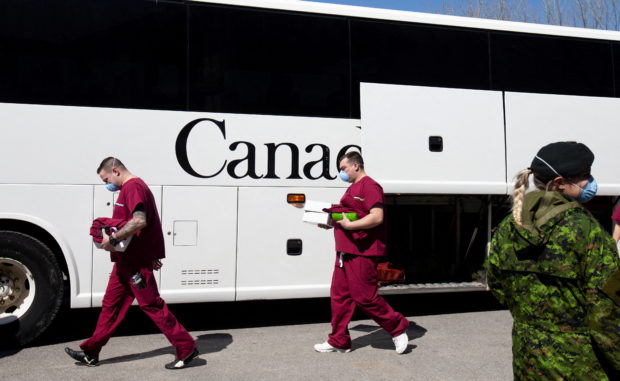
A bus carrying Canadian Armed Forces (CAF) medical personnel arrives at Villa Val des Arbres, a seniors’ long-term care centre, to help amid the outbreak of the coronavirus disease (COVID-19), in Montreal, Quebec, Canada April 20, 2020. (REUTERS)
OTTAWA – The Canadian province of Quebec is pressing ahead with a plan to levy a “health contribution” on adults refusing to get COVID-19 inoculations and will unveil details soon, premier Francois Legault said on Thursday.
Legault unveiled the proposal on Tuesday, sparking a nationwide debate about how far governments could go to ensure widespread vaccinations as the Omicron variant spreads.
Ontario, the most populous of the 10 provinces, rejected the idea on the grounds it was punitive.
A bill will be presented to the Quebec legislature for a debate early next month, Legault told reporters, dismissing opposition accusations that it would unfairly target the homeless, sick people and the mentally ill.
“There is no question of harming people who are in trouble. Our aim is to tell people who choose not to get vaccinated that there will be a price to pay because there will be an impact on society and how much our healthcare system costs,” he said.
Quebec says the contribution would be at least C$100 ($80). The idea may be lawful but could go against the spirit of Canada’s universal public health system, rights and medical experts say.
Legault said experts felt cases of COVID-19 had peaked a few days earlier and if all went well, they hoped hospitalizations caused by the virus would eventually decline significantly.
He also announced the province would next Monday scrap a curfew imposed late last month to stop the spread of Omicron.
Ontario, which together with Quebec accounts for more than 60% of the country’s population, said separately that Omicron transmissions could peak in the next few weeks.
“We are not yet out of the woods,” Ontario chief medical officer Kieran Moore told a briefing, stressing the need to continue vaccination efforts.